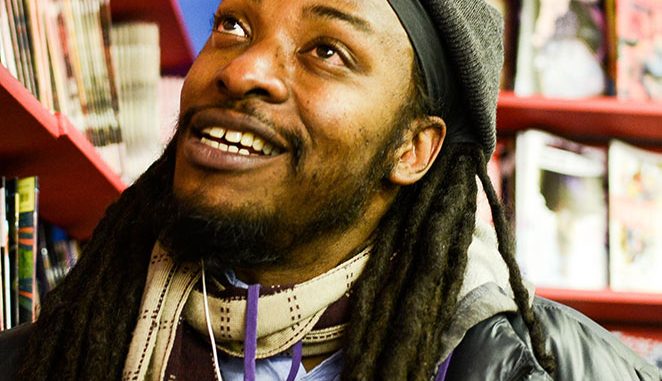

Philadelphia rapper Kinte McDaniel, who goes by his stage moniker Curly Castro, chose to attend Temple after his first visit in 1995 because it felt like his home in Brooklyn, N.Y.
McDaniel, who said he considers himself “your friendly neighborhood rapper,” dropped his latest album, “Fidel” last year, which features themes of rebellion against what many rappers have made their riches off of: sex, money and drugs.
His latest EP, “Brody,” released in March, does the same.
“Some name drop cars or books or people,” McDaniel said. “But I drop little bread crumbs of black power – African-American icons.”
McDaniel’s icons are prominent in history for being the cause of change – the biggest issue McDaniel said he believes Americans face today. McDaniel cites Malcolm X as someone he looks to for examples and said his rebellious nature and ability to control a crowd are traits he admires.
“Fidel” features songs about growing up in an African-American community and experiencing racial confusion attending a predominantly white school.
“I experienced eight years of school, being the black kid at the bat mitzvahs,” McDaniel said. “All of my black friends wondered why I was hanging with the white kids, and the white kids wanted to know why I wasn’t home in my neighborhood with the rest of the black kids.”
His song, “Colored Water Fountain,” examines the role of the media and those in positions of power feeding off of, and taking advantage of, African-American culture.
When McDaniel came to Temple 18 years ago, he considered himself a “hip-hop head,” but said his appreciation didn’t blossom into writing until his sophomore year. McDaniel started as a hype-man for his friends who performed, but decided to try his hand at rapping when he got into spoken word poetry.
McDaniel and some friends formed a group out of their dorm room in Peabody Hall called Nemesis and performed their first spontaneous show in front of the Bell Tower during the week of Spring Fling.
“I remember that I had to go to class after that because I had my book bag on,” McDaniel said. “I was nervous as all hell, but [the crowd] got really into it.”
After the first performance, McDaniel and his group performed at Greek events for the Hip-Hop Society and at the former Owl’s Nest during showcases. The group eventually performed at the University of Pennsylvania’s Armory, which was a significant performance for Castro.
“That was the night for me, when I realized this was it,” McDaniel said. “I wanted to quit school at that point to pursue the music, but I got my head on straight and finished.”
Soon after graduating in 2000, McDaniel joined forces with a rival rap group in Philadelphia to become the “super group” Bohemian Fifth.
For a few years, McDaniel jumped between groups but eventually decided that working alongside others’ careers was overwhelming and left the group to become a solo artist.
Once McDaniel started writing music on his own, he said his ideas about enacting change were able to shine through. McDaniel has collaborated with fellow artist Zilla Rocca often, and recorded a few songs on “Fidel” with him.
“He’s the most enthusiastic and selfless rapper I’ve ever met, which are two characteristics that run counter to the makeup of most people who want to rap,” Rocca said. “He’s incredibly reliable, original, and unafraid to convey his ideas.”
McDaniel said he feels that the country’s biggest problem at the moment is the mixture of classism and racism in the media.
“I feel that America is obsessed with the villain of the moment,” McDaniel said. “Right now, it is the people of Arab descent, people we used to ignore like they were invisible, and now we’re afraid to fly next to them – our fellow Americans.”
While McDaniel doesn’t consider himself anti-American, he said he respects and wants to eventually move to one of the upwardly mobile countries overseas that have universal health care and longer maternity leaves, as they put more value on quality of life.
McDaniel said that while many people believe change can be achieved through meetings and politics, he wants to take a more forward and musical approach.
“I would like to see America on the incline, a movement that we haven’t had in a long time,” McDaniel said. “I want to embody the word ‘activist’ by being active. I want to be able to enact the change that needs to happen here.”
Paige Gross can be reached at paige.gross1@temple.edu.


Be the first to comment